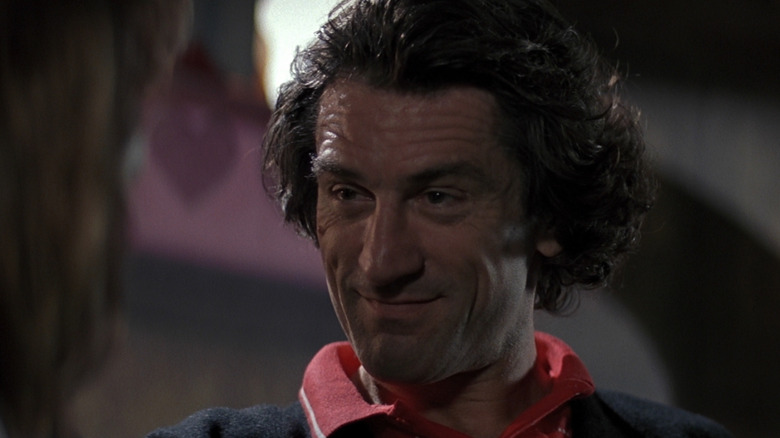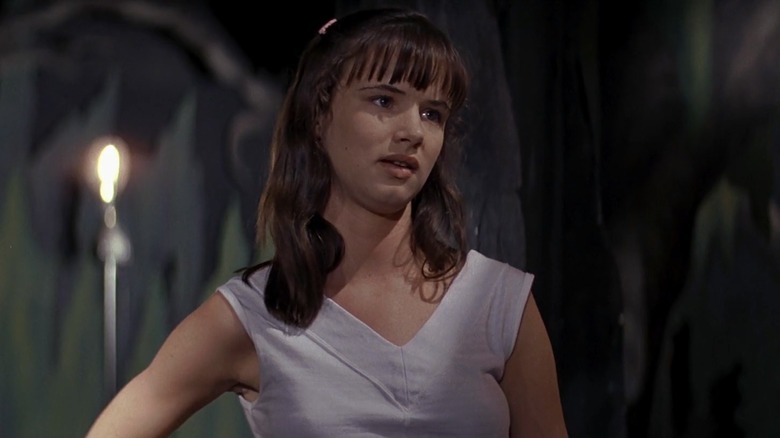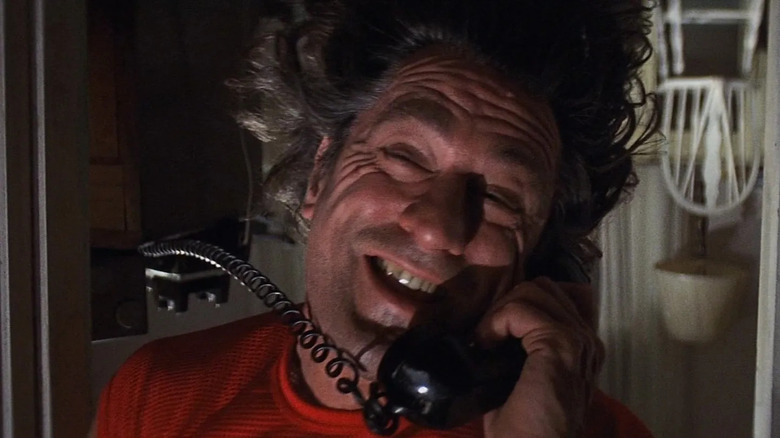Reese Witherspoon Failed Her Audition For An Iconic Robert De Niro Crime Thriller
In the late 1980s, Steven Spielberg and Martin Scorsese made a fascinating swap. After years of deliberating, Spielberg decided it was time to commit to "Schindler's List," which he had previously offered to Scorsese to direct. For his part, Scorsese agreed to remake "Cape Fear" instead (which Spielberg deemed too violent for himself), reasoning it was a good way to repay Universal for its faith after the controversy surrounding "The Last Temptation of Christ." Both movies would have no doubt looked very different otherwise, and the alternative cinematic reality doesn't end there.
For his modern update of J. Lee Thompson's 1962 thriller about a vicious sex offender preying on an attorney and his family, Scorsese originally wanted Harrison Ford to play Sam Bowden, the lawyer in question. Ford was more interested in playing against type as the villain, however, and turned the movie down when he couldn't get the role he wanted. A ripped and heavily inked Robert De Niro stepped into Cady's shoes instead to earn an Oscar nomination in a movie so iconic that it got its own full-length spoof episode of "The Simpsons." Also receiving an Academy Award nod was Juliette Lewis as 15-year-old tearaway Danielle Bowden, a part that might have landed much differently if Reese Witherspoon hadn't flunked her audition.
Witherspoon has since achieved Oscar recognition of her own, singing her way to Best Actress for "Walk the Line" and receiving an additional nomination for "Wild." Talking to Jimmy Kimmel in 2023 about how scary it was auditioning at the start of her career, she recalled reading for the key teenage role in "Cape Fear," saying:
"I didn't know who Robert De Niro was, so I was standing outside talking to the receptionist and she was like, 'You know he's the most important actor of our time?' And I was like... I was 14, and I'd never seen 'Goodfellas' and I'd never seen 'The Godfather,' so it totally got on my nerves."
She didn't get the gig, and neither did Moira Kelly, Martha Plimpton, Fairuza Balk, and Drew Barrymore. The part was eventually given to Lewis (then 17 years old), who was actually the first young actor to audition. Let's take a look back at Scorsese's "Cape Fear" and speculate on whether it would have worked with Witherspoon playing the not-so-innocent teenager who catches Cady's eye.
What happens in Cape Fear?
Based on John D. MacDonald's novel "The Executioners," both versions of "Cape Fear" follow the same basic storyline. Max Cady (Robert Mitchum/Robert De Niro) has spent time behind bars for sexual assault and blames attorney Sam Bowden (Gregory Peck/Nick Nolte) for his incarceration. Cunningly, Cady has also used his time in prison for self-education, learning the law so he knows how to stay just the right side of it as he begins stalking and intimidating the Bowden family upon his release. However, Cady is not just content exacting his revenge on Sam, as he heinously plans to violate both his wife (Polly Bergen/Jessica Lange) and his daughter (Lori Martin/Juliette Lewis) first. This threat lures Bowden down a murky path as he feels forced to pursue increasingly illegal methods to warn Cady off.
J. Lee Thompson's original version unapologetically preyed on our worst fears, namely the horror of sexual assault and the terrifying idea that we might not be able to protect our loved ones when a very bad man comes calling. Released at the beginning of the '60s at a time when sex and violence was generally more implied than shown, the film generated its tension through Thompson's taut direction, Mitchum's nonchalantly menacing performance, and Bernard Hermann's sinister score. Although the word "rape" was omitted from the screenplay, the film was still problematic for censors due to the "continuous threat of sexual assault on a child," and Thompson was required to make significant cuts to avoid the dreaded X certificate in Britain.
Martin Scorsese's remake amped up the sweaty Southern Gothic atmosphere and turned it into a full bore psycho-thriller. Interestingly, Wesley Strick's screenplay also tweaked the characters to make the Bowdens more dysfunctional this time around. Replacing Peck's typically upstanding attorney, Nolte's version is a sleazy lawyer who withheld evidence to send Cady down — perhaps understandable, but a decision that nevertheless puts a question mark next to his morals, especially since his marriage is also riven by affairs with other women. Upgrading Martin's bland girl-next-door type, Lewis's Danielle is similarly a troubled teenager who has been busted at school for drug use and feels misunderstood by her parents. Hence, under such circumstances, there are already cracks in the Bowden family unit that Cady seeks to exploit, not least when it comes to targeting Danielle.
Why Cape Fear is better with Juliette Lewis instead of Reese Witherspoon
Three decades after the original, Martin Scorsese's "Cape Fear" didn't need to hold back and the director could show Max Cady in brutal action, most notably in the shocking scene when he assaults Sam Bowden's colleague (Illeana Douglas) and bites her cheek off. But even that isn't the movie's most disturbing moment. That honor falls to the lengthy sequence where Cady, posing as Danielle's new drama teacher, lures her to a dimly-lit auditorium at school and starts seducing her. Once he has worked his way into her confidence, he makes her suck his thumb before kissing her.
The scene is troubling on many levels. It shows how a cunning predator like Cady can play on a kid's insecurities, and we fear for Danielle's safety after seeing how vicious he is in the previous attack. The glaring age difference between Robert De Niro and Juliette Lewis makes the sexual overtones very uncomfortable, to say the least. It called for a young actor who could hold her own against the Oscar-winning legend, and Lewis once recalled her first meeting with De Niro (via Los Angeles Times):
"It was to my advantage because I knew that was not a normal situation for [De Niro], interviewing young girls [...] I could tell he was a little uncomfortable. I mean, all the other girls came in with their moms. So, I said something to put him at ease. I summed everything up very quickly, meaning I didn't tell him an elaborate story of all the pieces of [crap] work I'd done. I said, 'If you want to see if I can act, just look at this movie-of-the-week I've done.'"
To Lewis's credit, her reactions to the thumb incident (which Scorsese and De Niro kept as a surprise until filming) sell the icky moment. It works so well because Lewis has always gravitated towards darker material, and her performances from when she was younger (see also: "What's Eating Gilbert Grape?" and "Natural Born Killers") had a streetwise edge that suggested she grew up knowing all about the crappy side of life. Contrastingly, Reese Witherspoon's early career was typified by a bright and breezy goody-two-shoes persona, giving the impression she was someone whose childhood passed without a care in the world. Throwing that kind of innocence in peril at the hands of Max Cady might have been a step too far for the film, so maybe it was a good thing she didn't pass the audition.


